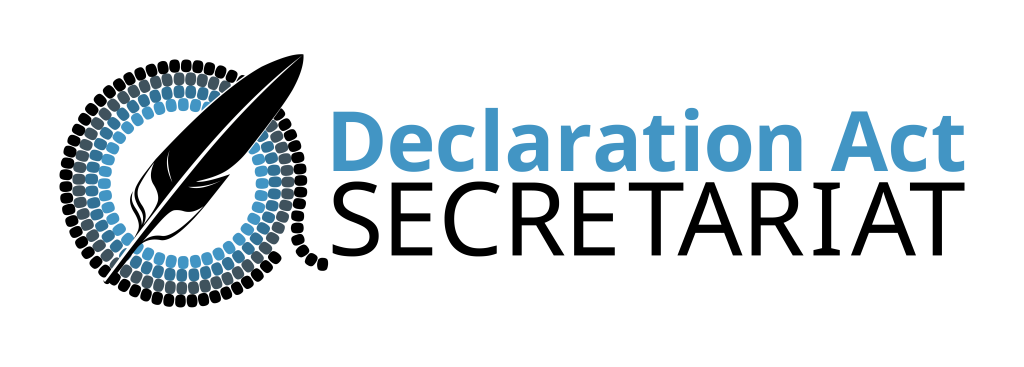
About the Secretariat
Announced in Budget 2022, the Secretariat’s core functions are to provide guidance on consultation and co-operation and consistency of laws; develop processes and measures to support alignment of laws; inform government’s legislative agenda and serve in an interlocutor role.
The work to align laws with the UN Declaration is resulting in an increasing number of provincial legislative reforms. The Province passed several bills since the Declaration Act came into law.
For example:
School Amendment Act (Bill 40)
The Ministry of Education and Child Care introduced changes to the School Amendment Act on October 25, 2023, with all changes in effect on April 30, 2024. Some of the changes include new provisions that set out a process for First Nations to choose which school First Nation students who live on-reserve, self-governing First Nation lands or Treaty lands will attend. All boards are also required to establish an Indigenous Education Council in their school district. While many school districts already have some form of Indigenous Education Council, this reset ensures that Indigenous Peoples are meaningfully engaged on decisions that directly affect Indigenous students, and that the councils are reflective of the district student population.
The Ministry of the Attorney General introduced new legislation on April 11, 2024. The Act passed into law on May 16, 2024. With this legislation, the B.C. government is taking action on systemic racism uncovered through race-based data collection and lived experiences of Indigenous Peoples and racialized communities. For example, the legislation requires the Province to strengthen checks and balances in its programs and services in hospitals, schools, courts and other public spaces. A new anti-racism committee will draw up a whole-of-government action plan to address systemic racism. The legislation fulfils Action 3.6 of the Declaration Act Action Plan, which commits the Province to introducing anti-racism legislation that addresses Indigenous-specific racism.
Emergency and Disaster Management Act (Bill 31)
The Ministry of Emergency Management and Climate Readiness introduced the legislation on October 3, 2023. On November 8, 2023, the Act came into force. This act formally recognizes First Nations’ inherent right of self-government in relation to emergency management. It establishes a framework for agreements between Indigenous governing bodies and other authorities that can help advance shared decision-making and coordination. The Act also includes engagement provisions that require the Province, local authorities and critical infrastructure owners to consult and cooperate with Indigenous governing bodies and incorporate Indigenous knowledge and cultural safety across emergency management practices.
Adoption Amendment Act (Bill 19) and the Child, Family and Community Service Amendment Act (Bill 5)
The Ministry of Children and Family Development introduced Bill 5 on Feb. 28, 2024, and it passed on March 14. Bill 19 was introduced on April 8, 2024, and passed on April 25. The amendments expanded the scope for joint and consent-based decision-making agreements in Indigenous child and family services creating a full pathway for dispute resolution through the provincial courts under Indigenous law. In addition, the amendments broadened the definition of “Indigenous child” so Indigenous governing bodies who are not yet exercising jurisdiction through a formal agreement can identify their children provincewide and be involved in the planning and coordination of their care. This legislation was developed in consultation and collaboration with Indigenous partners, regional health authorities and the BC Civil Liberties Association.
Health Professions & Occupations Act (Bill 36)
The Ministry of Health introduced this new legislation on October 19, 2022, as Bill 36. The Health Professions and Occupations Act passed into law on November 24, 2022. It enhances patient safety, strengthens oversight of health regulatory colleges and improves governance of health professionals.
With this legislation, the Province formally hardwires anti-discrimination measures, restorative processes, and trauma-informed practices directly into health profession legislation.
Indigenous Self-Government in Child and Family Services Amendment Act (Bill 38)
On October 26, 2022, the Ministry of Children and Family Development amended the Adoption Act and the Child, Family and Community Service Act, recognizing the inherent right of self-government of Indigenous communities including jurisdiction over child and family services. The amendments removed barriers in provincial legislation so Indigenous Peoples can deliver child and family services pursuant to their Indigenous laws, keeping Indigenous children and youth safely connected to family, community, and culture. One of the goals is to address and reduce the disproportionate numbers of Indigenous children and youth in provincial care. The amendment act passed into law on November 25, 2022.
Accessible British Columbia Act (Bill 6)
The Minister of Social Development and Poverty Reduction introduced the new legislation on April 28, 2021, as Bill 6. The Accessible British Columbia Act, passed into law June 3, 2021, establishes the legal framework to identify, prevent and remove barriers to accessibility including for Indigenous people.
Human Rights Code Amendment Act (Bill 18)
The Attorney General introduced this statute on November 17, 2021, as Bill 18. The bill, which was passed into law November 23, 2021, amended the provincial Human Rights Code to further uphold Indigenous human rights and advance reconciliation with Indigenous Peoples by adding Indigenous identity as a protected ground against discrimination.
Amendments to the Adoption Act (Bill 21)
The Ministry of Children and Family Development developed these amendments, which were introduced under a miscellaneous statute on October 7, 2021, as Bill 21. Passed into law October 21, 2021, the amendments authorized information-sharing under the Adoption Act. The changes established this authority to support First Nation adoptees in obtaining their status so they can gain access to federal health, dental and other benefits.
Amendments to the Child, Family and Community Service Act (Bill 21)
The Ministry of Children and Family Development developed these amendments, which were introduced under a miscellaneous statute on October 7, 2021, as Bill 21. The bill was passed into law October 21, 2021, aligning the Child, Family and Community Service Act with the information-sharing requirements of the federal statute, an act respecting First Nations, Inuit and Métis children, youth and families.
Forests Statutes Amendment Act (Bill 23)
The Minister of Forests introduced this statute on October 20, 2021, as Bill 23. Passed into law on November 23, 2021, the bill amended the Forests Act, the Forest and Range Practices Act, and the Forest Practices Code of British Columbia Act. These amendments establish the framework for an approach that is more focused on ecological and cultural values. A key part of this will be replacing forest stewardship plans, which are currently developed by industry, with forest landscape plans developed by the Province with First Nations, local communities and other partners, which will create new opportunities for shared decision-making between the Province and First Nations.
Education Statutes Amendment Act (Bill 25)
The Minister of Education and Child Care introduced the amendments on October 25, 2021, as Bill 25. Passed into law on November 2, 2021, the bill amended the First Nations Education Act, the Teachers Act, and the Criminal Records Review Act, all in support of First Nations’ jurisdiction over education on First Nation land. In addition, the legislation changed the composition of the British Columbia Teachers’ Council, ensuring representation and a voice for First Nations Education Authority.
Interpretation Amendment Act (Bill 29)
The Attorney General introduced this statute on November 17, 2021, as Bill 29, which was passed into law on November 23, 2021. This bill added a universal non-derogation clause to the Interpretation Act, making it explicit that provincial laws uphold, and do not abrogate or derogate from, the rights of Indigenous Peoples under Section 35 of the Constitution Act, 1982. Bill 29 also amended the Interpretation Act to provide that all provincial acts and regulations must be read to be consistent with the UN Declaration.
The progress of bills can be viewed on the Parliamentary Business website. Recent announcements on new or amended legislation can be found on the Working for you website.

